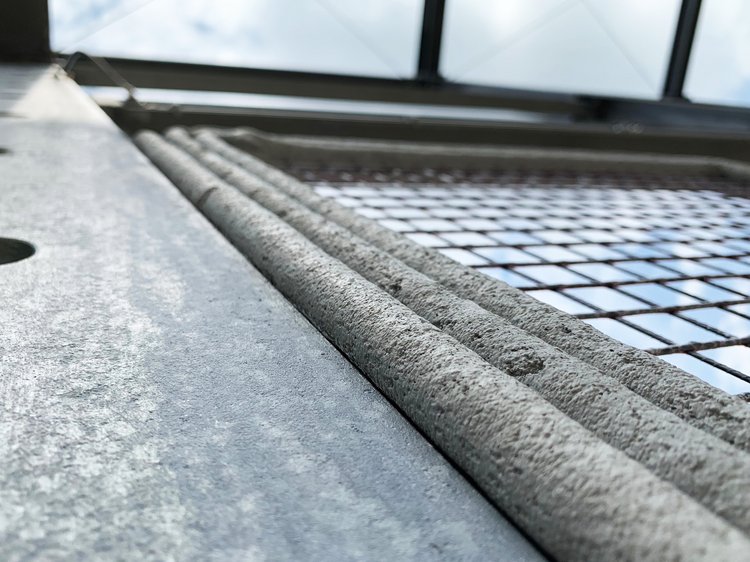summaery2019: Projects





submitted by
Prof. (Jun.-Prof.) Dr. Jan Willmann, M.A. Michael Braun
Co-Authors
Projekttitel:
Robotic Printed Morphologies.
Credits:
Bauhaus-Universität Weimar, Fachhochschule Dortmund, Universität Duisburg-Essen.
Team:
Prof. Dr. Jan Willmann, Prof. Dr. Volker Helm, Prof. Dr. Dieter Schramm, Dr. Tobias Bruckmann, Michael Braun (Projektleitung Design und Ausstellung), David Hahlbrock (Projektleitung Material und Fabrikation), Robin Heidel und Patrik Lemmen (Projektleitung Robotik), Philipp Enzmann, Urs Winandy, Daniel Lethert, Patrik Bartnik, Paul-Andreas Maurer und Daniel Horn.
Unterstützung:
Prof. Bernd Rudolf und Dr. Christian Hanke (Bauhaus-Universität Weimar), Prof. Dr. Thomas Straßmann (Fachhochschule Dortmund).
Ausgewählte Experten:
Dr. Michael Werner und Bernd Gehrke (Pagel
Spezial-Beton), Michael Engels und Uwe Flügel (Desoi GmbH).
Sponsoren:
Beckhoff Automation GmbH & Co. KG, Hülskens Holding GmbH & Co. KG, Desoi GmbH, Bosch Rexroth AG, Pagel Spezial-Beton, Carat Robotic Innovation, Wilhelm Kneitz Solutions in Textile, Ehepaar Oertgen (Duisburg), Inelta Sensorsysteme GmbH & Co. KG, Mehler Texnologies and Low & Bonar GmbH.
Zusätzliche Unterstützung:
Das Projekt wird von der Bauhaus-Universität Weimar und dem Kreativfond des Dezernats Forschung gefördert. Darüber hinaus wird das Projekt von der Fachhochschule Dortmund und der Abteilung „Forschung und Transfer“ sowie dem Fachbereich Maschinenbau unterstützt. Weitere Unterstützung leisten die Prorektorin für Gesellschaftliche Verantwortung, Diversität und Internationales an der Universität Duisburg-Essen und der Förderverein Universität Duisburg-Essen e.V.
Mentors
Professur für Theorie und Geschichte des Design
Faculty:
Architecture and Urbanism,
Art and Design
Degree programme:
Art and Design/Fine Art/Media Art (Doctor of Philosophy (Ph.D.))
Type of project presentation
Artwork
Semester
Summer semester 2019
attractive to children
Links
https://www.uni-weimar.de/de/kun...
Contributors:
Bauhaus-Universität Weimar, Fachhochschule Dortmund, Universität Duisburg-Essen
Capitalizing on the Bauhaus' legacy and celebrating a century of influence, Bauhaus-Universität Weimar, University of Applied Sciences Dortmund, and the University of Duisburg-Essen propose the world’s first cable-robotic installation using cementitious material for 3D-printing directly on site. Introducing a novel, sustainable, and economical, additive manufacturing method, the project pre-sents a radically new approach to computational design and (large-scale) robotic fabrication, and fundamentally challenges conventional approaches towards concrete construction. Here, a specifically designed algorithm will guide the cable-driven robot to extrude cementitious material in space, allowing to automatically aggregate the material in distinctive shapes without any additional formwork, and free from the touch of human hands. Ultimately, the installation comprises a modular panel system, exhibiting distinct features, such as: efficient use of material, while yielding high geometric flexibility and articulation.
Email: michael.braun[at]uni-weimar.de
Changes from color to monochrome mode
contrast active
contrast not active
Changes the background color from white to black
Darkmode active
Darkmode not active
Elements in focus are visually enhanced by an black underlay, while the font is whitened
Feedback active
Feedback not active
Halts animations on the page
Animations active
Animations not active